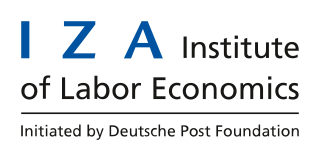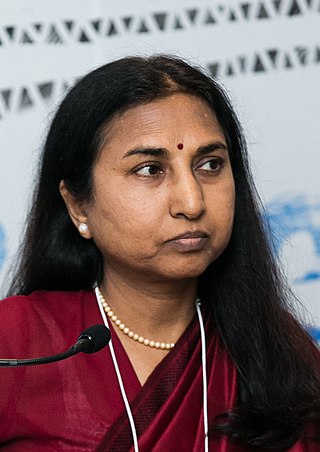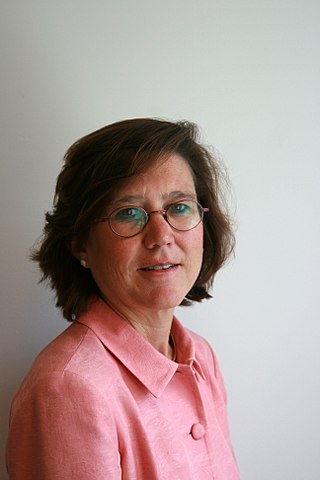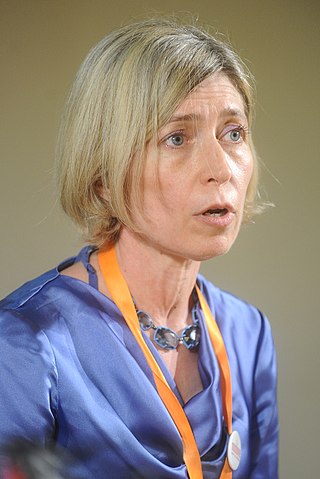Related Research Articles

The IZA - Institute of Labor Economics, until 2016 referred to as the Institute of the Study of Labor (IZA), is a private, independent economic research institute and academic network focused on the analysis of global labor markets and headquartered in Bonn, Germany.

Claudia Dale Goldin is an American economic historian and labor economist. She is the Henry Lee Professor of Economics at Harvard University. In October 2023, she was awarded the Sveriges Riksbank Prize in Economic Sciences in Memory of Alfred Nobel, "for having advanced our understanding of women's labor market outcomes,” as well as the root causes of the gender pay gap. She was the third woman to win the award, and the first woman to win the award solo.

Bina Agarwal is an Indian development economist and Professor of Development Economics and Environment at the Global Development Institute at The University of Manchester. She has written extensively on land, livelihoods and property rights; environment and development; the political economy of gender; poverty and inequality; legal change; and agriculture and technological transformation.

Debraj Ray is an Indian-American economist, who is currently teaching and working at New York University. His research interests focus on development economics and game theory. Ray served as Co-editor of the American Economic Review between 2012 and 2020.

Armin Falk is a German economist. He has held a chair at the University of Bonn since 2003.

Francine Dee Blau is an American economist and professor of economics as well as Industrial and Labor Relations at Cornell University. In 2010, Blau was the first woman to receive the IZA Prize in Labor Economics for her "seminal contributions to the economic analysis of labor market inequality." She was awarded the 2017 Jacob Mincer Award by the Society of Labor Economists in recognition of lifetime of contributions to the field of labor economics.

Carol Graham is the Leo Pasvolsky Senior Fellow at the Brookings Institution, a College Park professor at the School of Public Policy at the University of Maryland, a research fellow at the Institute for the Study of Labor (IZA), and the author of numerous books, papers and edited volume chapters.

Adriana Debora Kugler is an American economist who serves as a member of the Federal Reserve Board of Governors. She previously served as U.S. executive director at the World Bank, nominated by President Joe Biden and confirmed by the U.S. Senate in April 2022. She is a professor of public policy at Georgetown University's McCourt School of Public Policy and is currently on leave from her tenured position at Georgetown. She served as the Chief Economist to U.S. Labor Secretary Hilda L. Solis from September 6, 2011 to January 4, 2013.

David H. Autor is an American economist, public policy scholar, and professor of economics at the Massachusetts Institute of Technology (MIT), where he also acts as co-director of the School Effectiveness and Inequality Initiative. Although Autor has contributed to a variety of fields in economics his research generally focuses on topics from labor economics.

Oriana Bandiera, FBA is an Italian development economist and academic, who is currently the Sir Anthony Atkinson Professor of Economics at the London School of Economics. Her research focuses on development, labour, and organisational economics. Outside of her academic appointment, she is co-editor of Econometrica, and an affiliate of the Centre for Economic Policy Research and Bureau for Research and Economic Analysis of Development. A fellow of the Econometric Society and the British Academy, she received the Yrjö Jahnsson Award in 2019, an award granted annually to the best European economist(s) under the age of 45.
Ragui A. Assaad is an Egyptian economist and Professor of Planning and Public Affairs at the Humphrey School of Public Affairs. His research interests include labour economics, inequality and the economics of education. He ranks among the most prominent economists of Egypt.

Sholeh Maani is a New Zealand economics academic. She is a full professor at the University of Auckland.
Leah Platt Boustan is an economist who is currently a professor of economics at Princeton University. Her research interests include economic history, labour economics, and urban economics.
Nicole M. Fortin is a Professor in the Vancouver School of Economics (VSE) at University of British Columbia, where she obtained her Ph.D. in Economics. Before moving to Vancouver, B.C. in 1999, Fortin taught at Université de Montréal for ten years in her hometown. She was the President of the Canadian Women Economic Network (CWEN) in 2013–2014. Her research focus is placed on three main themes, including the linkage between labour market institutions and wage inequality, issues related to the economic progress of gender equality, as well as contributions to decomposition methods. Notably, Fortin contributed to the ground-breaking research presented in the 2015 World Happiness Report by examining how various factors impact feelings of happiness for individuals, and societal well-being overall, across the globe.
Siwan Anderson is a Canadian economist and professor at the Vancouver School of Economics (VSE) at the University of British Columbia (UBC). Her area of focus is on development economics with a micro-level approach focusing on institutions in developing countries, and also gender economics focusing on the role of women in the economy. Siwan Anderson is also an Associate of the Canadian Institute for Advanced Research (CIFAR), an Associate of the Theoretical Research in Development Economics (ThReD), a Fellow of the Bureau for Research and Economic Analysis of Development (BREAD), and a Faculty Associate of the Center for Effective Global Action (CEGA). Siwan Anderson is the first woman to receive the John Rae Prize from the Canadian Economics Association.
Lisa Cameron is an Australian economist currently working as a Professional Research Fellow at the Melbourne Institute of Applied Economic and Social Research at the University of Melbourne.
Chinhui Juhn is the Henry Graham Professor of Economics at the University of Houston, a Research Associate of the National Bureau of Economic Research, and a Research Fellow of IZA Institute of Labor Economics. She graduated from Yale University in 1984, and completed her PhD in economics at the University of Chicago in 1991. She is an Editor of the American Economic Review, one of the most cited journals in the world. Together with her husband, Edward R. Allen III, she is a patron of the arts in Houston.
Aysit Tansel is a Turkish economist and Professor of Economics at the Middle East Technical University in Ankara. Her research revolves mainly around labour economics, with a focus on the economics of education. She ranks among the foremost Turkish economists in terms of research output.
Cecilia García-Peñalosa is a Spanish economist and a research fellow at the Aix-Marseille University. She is also a research professor at the Institute for Fiscal Studies and has an affiliation with the Bank of France. She was an associate editor of the European Economic Review and is currently an associate editor at the Journal of Economic Inequality.
Graziella Bertocchi is an Italian economist and Professor of Economics at the University of Modena and Reggio Emilia in Modena, Italy. She is known for her work connecting economic growth within a historical perspective.
References
- 1 2 3 "Garance Genicot". faculty.georgetown.edu. Retrieved 2016-07-07.
- ↑ "People - ThReD - Theoretical Research in Development Economics".
- ↑ "Garance Genicot".
- ↑ https://portal.cepr.org/.
{{cite web}}: Missing or empty|title=(help) - ↑ "People | BREAD". 8 January 2024.
- ↑ "IZA - Garance Genicot". www.iza.org. Retrieved 2016-07-07.
- ↑ Staff, WSJ (2012-10-31). "Economics Journal: What Price for Women's Rights?". Wall Street Journal. Retrieved 2016-07-07.
- ↑ Rauf, Tamkinat (2014-05-21). "Minimum Wage: The Nobel Thing to Do". Chicago Policy Review. Retrieved 2016-07-07.
- ↑ "Archived copy" (PDF). Archived from the original (PDF) on 2017-01-16. Retrieved 2016-07-07.
{{cite web}}: CS1 maint: archived copy as title (link) - ↑ Porter, Eduardo (2014-06-10). "One Key to Success: A Belief in a Future". The New York Times. ISSN 0362-4331 . Retrieved 2016-07-07.
- ↑ Genicot, Garance; Ray, Debraj (2017). "Aspirations and Inequality" (PDF). Econometrica. 85 (2): 489–519. doi: 10.3982/ECTA13865 .
- ↑ Journal of Development Economics Editorial Board . Retrieved 2016-07-07.
{{cite book}}:|website=ignored (help) - ↑ Lalwani, Nikita (2014-03-27). "Educated Women Are Less Vulnerable, Right?". Wall Street Journal. Retrieved 2016-07-07.
- ↑ "Visiteurs | AMSE". www.amse-aixmarseille.fr/. Retrieved 2021-11-22.